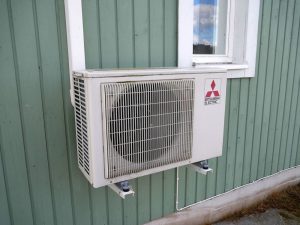
Vermont Gas Systems is offering to install electric heat pumps in their customers’ homes, the latest example of how state policy is nudging the utility to adapt its business model.
In order to comply with the state’s climate mandates, the utility is building a broader portfolio of thermal systems that will help both the business and its customers make the transition to a decarbonized future, said Richard Donnelly, the company’s director of energy innovation.
“We offer natural gas, energy-efficient products, weatherization, renewable natural gas, heat pump water heaters, and now heat pumps,” he said.
Expanding its offerings also puts the company in a good position to comply with the state’s new Clean Heat Standard, which became law last week after the legislature overrode a veto by Republican Gov. Phil Scott. Once implemented in 2025, the law will require fuel dealers to reduce the amount of fossil fuel they sell over time, or earn “clean heat credits” by doing things that offset building emissions, such as weatherization services and installing heat pumps.
Under the new heat pump program launched this month, the state’s only natural gas utility will use its in-house service technicians to install centrally ducted, cold-climate heat pumps in qualifying homes. The highly efficient systems use electricity, rather than fossil fuels, to heat and cool homes.
Customers will be able to either buy or lease the systems at rates that factor in the heat pump rebates available through the state’s utilities in partnership with Efficiency Vermont.
Sign up for Energy News Weekly
Get the most important energy news of the week delivered directly to your inbox.
“We’ll process that rebate up front for a purchase, and bake it into our lease prices as well,” Donnelly said.
Each system will use the home’s existing ductwork, and be integrated with the homeowner’s gas furnace, which will serve as a backup heating source during extremely cold weather. A smart thermostat will automatically switch back and forth between the heating sources according to the customer’s settings.
“We are offering our customers an opportunity to diversify their heating system, adding in the benefits of resiliency,” Donnelly said. “This is also an opportunity to reduce their carbon footprint.”
In order to qualify, homes must already have ductwork that delivers heat through vents. They must also have a fairly efficient furnace.
An estimated 14,000 of the utility’s 55,000 customers could be eligible. Most homes in the company’s service area have hydronic heating systems with radiators or baseboard radiators; Donnelly said the company will begin offering heat pump solutions for those customers in the future.
The new program comes just over a year after Vermont Gas announced it would begin installing electric heat pump water heaters for its customers. The company is also looking for a site to test its first fossil fuel-free networked geothermal project, another possible business to branch into as the state moves away from fossil fuels.
“As a distribution utility, energy efficiency utility, and integrated energy services provider, Vermont Gas is uniquely positioned to help its customers take advantage of the latest and most cost-effective technology,” said Dylan Giambatista, the company’s public affairs director.
Vermont’s climate mandates call for reducing greenhouse gas emissions by 26% from 2005 levels by 2025, 40% from 1990 levels by 2030, and 80% by 2050.
“We are going to need a lot of different partners” to meet those goals, said Johanna Miller, energy and climate program director for the Vermont Natural Resources Council. “To the degree that our utilities like Vermont Gas will lean into and help their customers cut costs and cut carbon, I think that that is important.”
Gas heating customers switching to electric heat pumps won’t necessarily save money, at least for now. While the heat pumps are more efficient, gas is currently the cheaper source for heating, Donnelly said.
But the company is developing an online calculator that will allow customers to see how setting the system to swap over to the furnace at 20 degrees versus, say, 25 degrees will compare in terms of carbon reduction and heating costs. They will also be able to measure the carbon and cost impact of adding in renewable natural gas.
“A lot of our customers are motivated by carbon reduction, but they don’t know how much a heat pump would help in terms of their overall consumption,” Donnelly said. “We’re taking that role to educate.”
Giambatista said he installed a heat pump in his 1945 house last fall. He set the smart thermometer to swap over to his gas furnace when temperatures dropped to 25 degrees. Over the winter his gas usage dropped by about 60% compared to previous years, he said.
To date, about 45,000 ducted and ductless heat pumps have been installed in Vermont under the state’s rebate program, according to Phil Bickel, HVAC and refrigeration program manager at Efficiency Vermont.
They are primarily in homes that heat with fuel oil, the majority of homes in the state.
“We’ve seen the cost of all fossil fuels go up and down over the years,” Bickel said. “The main thing about making the switch to heat pumps is it provides a little bit more of a stable cost. They are three times more efficient than oil or propane, and they also provide the low carbon benefit, as well as the cooling benefit.”
Efficiency Vermont does recommend that homeowners maintain a backup source for heat. The heat pumps work well down to about -15 degrees, “but in Vermont, there are those times when we are going to have a long cold snap,” Bickel said.



